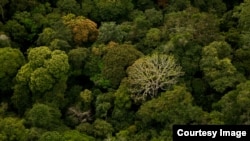Gabon is one of the greenest countries in the world, where forests cover 88% of the land. Backers of a historic agreement between Gabon and Norway are seeking to ensure it stays that way.
Through the U.N.-backed Central African Forest Initiative (CAFI), Norway will pay Gabon up to $150 million over 10 years in exchange for Gabon reducing its carbon emissions, highlighting the forests’ role in absorbing carbon dioxide.
In an interview with Voice of America, Lee White, Gabon’s minister of forests, said the agreement is groundbreaking because it makes preserving forests nearly as valuable as chopping them down.
“In all of the deals we've seen over the years, forest carbon has been worth $5 a ton. And in this one, subject to meeting best practice, they’ve gone to $10. So overnight, we doubled the price of forest carbon. It gives a lot of hope to all the other forest nations,” he said.
In a statement, CAFI said the deal will allow Gabon to achieve its goal of preserving 98% of its existing rainforest. Across Central Africa, forests store as much as 70 billion tons of carbon, which is equal to five to 10 years of global greenhouse gas emissions, CAFI said.
The Central Africa forests are the second-largest rainforest in the world, sometimes called “Earth’s second lung.”
White said the agreement is part of a larger effort by Gabon to preserve its forests. Ten years ago, the country made headlines by announcing an end to raw timber exports. Although logging continues for processed wood products and domestic use, it is done in a sustainable way, White said.
“We’ve doubled the number of forestry jobs, and we’re opening new processing plants pretty much every month. And so that measure is starting to pay off. And what we’re finding is that we can make more money and create more jobs by exploiting less,” he said.
He added that these steps reverse centuries of exploitation of natural resources on the African continent by Europeans.
“If you look at the history of the continent, it’s been about ripping out cheap natural resources and sending it to other parts of the world to develop,” White said. “So Africa fueled the Industrial Revolution. Africa has fueled part of China’s rise.… And so the first component of it is to make the use of our natural resources indigenous to transform things locally.”






